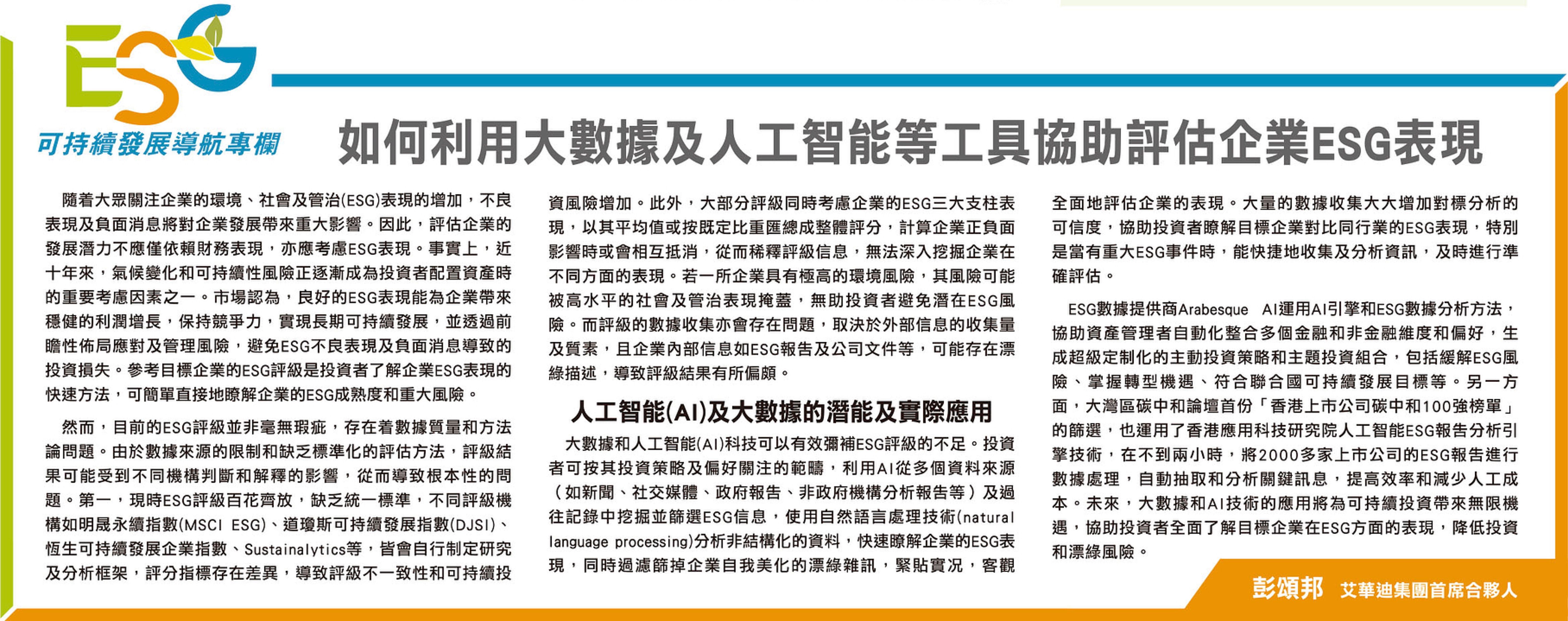AVISTA [Ming Pao Column] Series: Leveraging Big Data & Artificial Intelligence in ESG Performance Evaluation
Original article (only available in Chinses): 如何利用大數據及人工智能等工具協助評估企業ESG表現 | 明報
In light of the heightened focus on environmental, social, and governance (ESG) performance in the corporate landscape, poor performance and negative news will have a significant impact on corporate development. Therefore, assessing the development potential of a company should not rely solely on financial metrics but should also consider ESG performance. Over the past ten years, factors such as climate change and sustainability risks have increasingly emerged as key factors for investors in their asset allocation decisions. The market believes that strong ESG performance can facilitate consistent profit growth, sustain competitive advantage, and enable long-term sustainable development. Moreover, it allows organizations to proactively identify and manage risks through forward-looking strategies, mitigating investment losses attributable to inadequate ESG performance or negative news. As a practical tool for investors, ESG ratings offer a convenient and accessible means to gauge a target company's ESG performance. By referring to these ratings, investors can rapidly and directly comprehend a firm's ESG maturity and discern its significant risk exposures.
ESG ratings are crucial in evaluating a company's sustainability performance, but their effectiveness is compromised by several data quality and methodology issues. The effectiveness of ESG ratings is hampered by limitations in data sources and the lack of standardized evaluation methods, leading to varying institutional judgments and interpretations that can cause fundamental problems. Firstly, current ESG ratings suffer from a lack of unified standards, with different rating agencies like MSCI ESG, DJSI, Hang Seng Sustainable Development Enterprise Index, and Sustainalytics establishing their research and analysis frameworks. This results in inconsistencies in rating indicators and increases sustainable investment risks. Additionally, most ratings consider the performance of the three ESG pillars and use their average value or predetermined weight to aggregate them into an overall score. This approach may offset positive and negative impacts, dilute rating information, and failing to analyze a company's performance in different aspects. In some cases, strong social and governance performance may overshadow severe environmental risks, providing little assistance to investors seeking to mitigate potential ESG risks. Furthermore, The effectiveness of ESG ratings hinges on the reliability of external information collected. Nevertheless, internal corporate information such as ESG reports and company documents may contain misleading claims, resulting in biased rating results.

Potential and Practical Applications of Artificial Intelligence (AI) and Big Data
Big data and AI technology can effectively address the challenges posed by ESG ratings. Investors can use AI to mine and filter ESG information from multiple data sources (such as news, social media, government reports, NGO analysis reports, etc.) and previous records according to their investment strategies and areas of interest. Natural language processing technology can be used to analyze unstructured data and comprehensively evaluate a company's ESG performance while filtering out greenwashing noise. Massive data collection significantly improves benchmark analysis credibility, allowing investors to gain insight into the target company's ESG performance relative to industry peers, especially during major ESG events. This enables timely and accurate assessments through quick data collection and analysis.
ESG data provider Arabesque AI uses AI engines and ESG data analysis methods to help asset managers automate the integration of multiple financial and non-financial dimensions and preferences, generating highly customized active investment strategies and thematic investment portfolios, including mitigating ESG risks, seizing transition opportunities, and aligning with the United Nations Sustainable Development Goals. On the other hand, the screening process for the first "Top 100 Carbon Neutral Hong Kong Listed Companies" by the Greater Bay Area Carbon Neutrality Symposium (“大灣區碳中和論壇”) leveraged the AI ESG report analysis engine technology developed by the Hong Kong Applied Science and Technology Research Institute(“香港應用科技研究院”). With this technology, data from over 2,000 listed companies' ESG reports was processed in under two hours, during which the engine automatically extracted and analyzed key information, enhancing efficiency while also reducing manual costs. In the future, the application of big data and AI technology will bring infinite opportunities for sustainable investment, helping investors comprehensively understand the target company's performance in ESG aspects, reducing investment and greenwashing risks.
Meet Our People

VINCENT PANG
Managing Partner
AVISTA GROUP
vincent.pang@avaval.com

SABRINA LAM
Director
RISK MANAGEMENT ADVISORY
sabrina.lam@avaval.com
Date: 24 Mar 2023 | Tags: Risk Management , ESG
